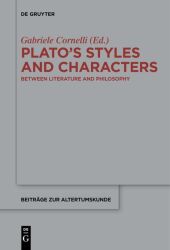 Neuerscheinungen 2017Stand: 2020-02-01 |
Schnellsuche
ISBN/Stichwort/Autor
|
Herderstraße 10
10625 Berlin
Tel.: 030 315 714 16
Fax 030 315 714 14
info@buchspektrum.de |

Gabriele Cornelli
Plato´s Styles and Characters
Between Literature and Philosophy
Herausgegeben von Cornelli, Gabriele
2017. 436 S. 155 x 230 mm
Verlag/Jahr: DE GRUYTER 2017
ISBN: 3-11-057817-4 (3110578174)
Neue ISBN: 978-3-11-057817-1 (9783110578171)
Preis und Lieferzeit: Bitte klicken
Die Beiträge zur Altertumskunde enthalten Monographien, Sammelbände, Editionen, Übersetzungen und Kommentare zu Themen aus den Bereichen Klassische, Mittel- und Neulateinische Philologie, Alte Geschichte, Archäologie, Antike Philosophie sowie Nachwirken der Antike bis in die Neuzeit. Dadurch leistet die Reihe einen umfassenden Beitrag zur Erschließung klassischer Literatur und zur Forschung im gesamten Gebiet der Altertumswissenschaften.
The volumes published in the series "Beiträge zur Altertumskunde" comprise monographs, collective volumes, editions, translations and commentaries on various topics from the fields of Greek and Latin Philology, Ancient History, Archeology, Ancient Philosophy as well as Classical Reception Studies. The series thus offers indispensable research tools for a wide range of disciplines related to Ancient Studies.
The significance of Plato´s literary style to the content of his ideas is perhaps one of the central problems in the study of Plato and Ancient Philosophy as a whole. As Samuel Scolnicov points out in this collection, many other philosophers have employed literary techniques to express their ideas, just as many literary authors have exemplified philosophical ideas in their narratives, but for no other philosopher does the mode of expression play such a vital role in their thought as it does for Plato. And yet, even after two thousand years there is still no consensus about why Plato expresses his ideas in this distinctive style. Selected from the first Latin American Area meeting of the International Plato Society (www.platosociety.org) in Brazil in 2012, the following collection of essays presents some of the most recent scholarship from around the world on the wide range of issues related to Plato´s dialogue form. The essays can be divided into three categories. The first addresses general questions concerning Plato´s literary style. The second concerns the relation of his style to other genres and traditions in Ancient Greece. And the third examines Plato´s characters and his purpose in using them.
Gabriele Cornelli, Universidade de Brasília, Brazil.


